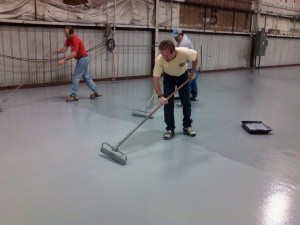Large industrial floor coating projects are indeed capital investments. You want to get the most use out of your investment for the longest you possibly can while meeting all of the epoxy flooring requirements.
The best way to keep your floor performing optimally is with proper, routine cleaning and epoxy flooring maintenance. A scheduled cleaning program utilizing the right equipment and cleaners, combined with minor maintenance and repairs, can keep your floor performing as a solid foundation for your facility.
Dirt, Debris and Safety
Excess dirt and debris on a floor surface can be very abrasive as personnel walk and material handling/wheeled traffic move and travel across the surface. Routine cleaning and will minimize the abrasive effect, extending the gloss and integrity of any floor surface. A common reason companies recoat the floor is to hide scratches and restore gloss damaged from aggressive traffic or build-up of dirt and debris that was not properly cleaned and maintained. Keeping your floor clean and dirt-free will promote a long service life.
Even if your floor is textured for safety, not properly cleaning can cause dirt and debris to build-up, rendering the texture less effective. Additionally, untreated cracks or gouges can present trip and fall hazards, potentially affecting your employee safety and your bottom line.
Chemicals
Most industrial processes involve some kind of chemicals. At some point, chemicals will come in contact with the floor coating. Proper cleaning of these chemicals is crucial to a long-lasting floor. Additionally, it is important to know which chemicals (and concentrations) have the potential to come in contact with the floor, and it is important to share this with your flooring team prior to installing a new floor coating system. Your flooring team will recommend the right system topcoat to withstand these chemicals.
Aggressive chemical spills, if not properly treated, can dull or deteriorate your floor coating system. In extreme cases, these chemicals can literary eat through your floor coating system and seep into your concrete substrate, creating even bigger problems. Your floor coating professional can review the chemicals used in your business process and can recommend a floor coating system that can stand-up to these chemicals, ensuring a longer service life.
A Consistent Maintenance Routine
Plan for routine floor maintenance and repair. Routine epoxy flooring maintenance allows you to stay on top of small problems before they become larger ones. By routinely examining your floor for any chips or cracks and making small floor repairs a part of your maintenance regimen, you can avoid larger, more costly repairs (or replacement) in the long run. Most manufacturer’s offer DIY patch kits, or will work with you to repair small problem areas. Sometimes, applying a fresh topcoat over a smaller area that has experienced aggressive wear, is all that you need. Your flooring professional is there to help you get the most out of your flooring investment.
Is floor cleaning and maintenance important for your business?
Download our free guide, “Cleaning & Maintenance Instructions for polymer floor coating systems”
Protective Industrial Polymers offers a complete line of Polymer Flooring Systems which will support your capital investment life-cycle expectations.


